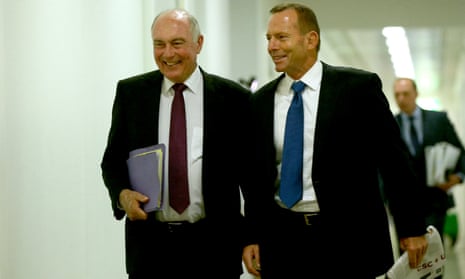Tony Abbott has confirmed the obvious. The backbench “revolt” over the Coalition’s tax policy has really been about trying to corral Malcolm Turnbull into repeating his predecessor’s rejected budget policy.
Because of course if Turnbull goes along with the “revolters” and rejects options to reduce tax concessions for the very rich, he will be left with the only other way to pay for anything he wants to do, without increasing the budget deficit. Spending cuts.
Which is exactly what Abbott urged him to do in the party room on Tuesday – in a sugar-coated exchange in which Abbott espoused Turnbull’s “brilliance” in attacking Labor’s negative gearing cuts – and then said that was exactly why the government should not be introducing any of its own. That and the “truisms” that “we don’t have a revenue problem, we have a spending problem” and “you can’t cut taxes by raising them”. (You can obviously cut personal income taxes by reducing loopholes and tax concessions but no one seems to have mentioned that)
Since defence spending has just been quarantined – for better or for worse – the “savings challenge” Abbott refers to inevitably means cuts to social security, health and education. Pretty much the strategy in the 2014 budget. The one Tony Abbott said at the weekend he wears as “a badge of honour”. The one rejected by voters on equity grounds. What a surprise.
As has been thoroughly chewed over by now, Turnbull has brought much of his current difficulty upon himself by leaving his tax policy as a blank page. That didn’t just allow Labor to fill in the gaps with its tax policy, it allowed the economic dries in his own party time to mount a public campaign, sometimes in interviews, more often in anonymously sourced quotes, to try to push the Coalition away from progressive tax changes and, by elimination, back towards regressive spending cuts.
The backbenchers have spent the past few weeks warning against the option of putting a cap on the amount that can be claimed as negative gearing concessions and they are also lobbying against the idea of reducing the concessional contributions that can be made to superannuation.
Smart governments always look for savings but the Abbott recipe of focusing only on savings was tried in 2014, had the inevitable consequences for fairness and wasn’t really “embraced” by voters. (Abbott said Turnbull had the communications skills to carry the argument for spending cuts – as if the only problem with the 2014 budget had been the sales pitch.)
It is unclear whether Turnbull will be influenced by this corralling exercise or Abbott’s party room challenge. His departmental secretary, Martin Parkinson, is now overseeing the policy process with announcements expected within weeks. On the table are a range of tax changes (but not the GST) as well as spending cuts, with the money to be used for small personal income tax cuts and some interim spending, including funding for hospitals (to make up for Abbott’s 2014 cuts).
The government also has to decide what to do with $10bn of Abbott-era cuts still hanging around the Senate with little hope of being passed.
Turnbull’s response in the party room was an equally sugar-coated reply – extolling Abbott’s “courage” in instigating the tax review in the first place. Apparently the fact that the former prime minister then very quickly ruled out almost all options wasn’t mentioned in the assessment of his bravery. The person giving the official Coalition briefing described the discussion between current and former leaders as an “almost nauseating exchange of compliments”.
Turnbull is already looking weaker because of concessions made to some of the same conservative right wing of his party on social issues.
It seems he was trying to defuse backbench complaints about the Safe Schools program last week when he said the minister would look at its content but that concession has now become a formal “review” and has been claimed as a victory by opponents of the scheme. Some of their rhetoric over recent days has surely underlined all the reasons why a tolerance campaign is needed. Enter Abbott again, fancy that, calling for the program to be defunded because it is actually “social engineering”, despite having been funded during his years as prime minister.
Voters are more likely to be excited to see clear evidence of the changes Turnbull promised in the first place – particularly that equity will be at the heart of his economic policy – which means cuts to tax concessions as well as government spending.

